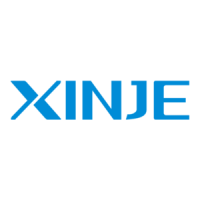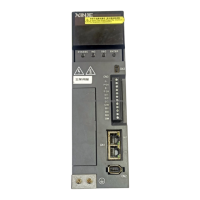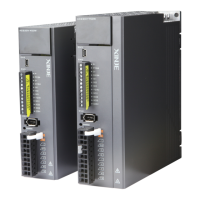Do you have a question about the Xinje DS5E Series and is the answer not in the manual?
Check integrity, model match, and absence of damage or loose parts.
Notes on wiring, power supply, and product handling during installation.
Specific instructions for safe and correct wiring practices, including grounding.
Safety guidelines for operating the servo drive and motor during use.
Precautions for safe maintenance and inspection of the servo drive.
Important considerations for proper and safe wiring of the system.
Guidelines for selecting the appropriate servo drive model.
Explanation of the naming convention for servo drive models.
Description and identification of the main parts of the servo drive.
Technical specifications including applicable encoder, power, conditions, and structure.
Explanation of the naming convention for servo motor models.
Description and identification of the main parts of the servo motor.
Model naming conventions for encoder cables.
Model naming conventions for power cables.
Model naming conventions for brake cables.
Pin definitions and connection details for encoder cables on the driver and motor sides.
Pin definitions and connection details for power cables on the driver and motor sides.
Guidelines for selecting regenerative resistance based on servo driver model.
Instructions for installing the servo driver, including site, environment, and standards.
Recommended location and environmental conditions for installing the servo driver.
Environmental specifications for servo driver operation and storage.
Guidelines for installing servo drivers side by side in a control cabinet.
Requirements for proper cooling and airflow around servo drives.
Guidelines for installing multiple servo drives adjacent to each other.
Environmental conditions within the control panel for optimal servo driver operation.
Recommended environments and precautions for installing servo motors.
Environmental specifications and protection levels for servo motors.
Precautions for mounting, centering, antirust, encoder, oil/water, cable stress, and connector handling.
Dimensional drawings for DS5E/L-20P1, DS5E/L-20P2, and DS5E/L-20P4 servo drivers.
Dimensional drawings for the DS5E/L-20P7 servo driver.
Dimensional drawings for DS5E/L-21P5, DS5E/L-22P3, DS5E/L-22P6, and DS5E-41P5 servo drivers.
Dimensional drawings for DS5E-45P5 and DS5E-47P5 servo drivers.
Installation dimensions for 40 series servo motors.
Installation dimensions for 60 series servo motors.
Installation dimensions for 80 series servo motors.
Installation dimensions for 110 series servo motors.
Installation dimensions for 130 series servo motors.
Installation dimensions for 180 series servo motors.
Table detailing recommended wire specifications for servo driver interfaces.
Details on servo driver terminal arrangements and explanations of main circuit terminals.
Specific main circuit terminal configurations for different DS5E/L servo driver models.
Detailed pin descriptions for CN0, CN1, and CN2 connectors.
Information on RS-232 and RS-485 communication ports and their parameters.
Explanation of pulse signal types, input modes, and interface circuits.
Details on using SI input terminals for relays or open collector circuits.
Description of SO output terminals for optocoupler and relay types.
Notes that analog input and encoder feedback output are not supported for DS5E/5L.
Description of the operating panel layout and its basic functions.
Explanation of the functions of each button on the operate panel.
Explanation of digit and short code displays for speed and torque control modes.
Explanation of digit and short code displays for position control mode.
Monitoring and distribution of U0-21 input signals.
Monitoring and distribution of U0-22 input signals.
Monitoring and distribution of U0-23 output signals.
Monitoring and distribution of U0-24 output signals.
Explanation of F0 parameters for alarm clear, default settings, and auto-tuning.
Explanation of F1 parameters for jog run, test run, current sampling, and forced enable.
Overview of essential parameters for position control using external pulse instructions.
Details on advanced parameters for position control, such as command filters and pulse clearing.
Configuration for pulse instruction direction, form (CW/CCW, AB, P+D), and details of pulse signals.
Explanation and calculation of electronic gear ratio for precise positioning.
Steps to calculate electronic gear ratio or pulse numbers per rotation.
Function and parameter for clearing pulse deviation in position mode.
Signals indicating successful positioning and their setup.
Signal indicating proximity to the target position for advance preparation.
Parameters for inhibiting pulse input and setting position pulse deviation limits.
Overview of fundamental parameters for internal position control.
Details on advanced parameters for internal position control, including finding origin points.
Parameters for selecting control modes and configuring internal position modes.
Configuration for waiting modes and step change modes within internal position control.
Settings for relative/absolute positioning and parameters for up to 35 position segments.
Signals for changing steps, pausing, and skipping segments in internal position control.
Procedures and signals for finding the reference origin on the forward or reverse side.
Overview of fundamental parameters for internal speed control.
Configuration for internal speed settings (speed 1, 2, 3) and soft start parameters.
Configuration of input signals (SPD-D, SPD-A, SPD-B) for direction and speed selection.
Parameters for limiting speed commands and enabling zero clamp function.
Configuration for internal and external torque limits.
Signals for detecting same speed and reaching target speed.
Parameters for setting alarm speeds and applying speed command filters.
Setting for proportion action command used in PI control.
Overview of fundamental parameters for speed control using pulse frequency.
Details on parameters for proportion action, zero clamp, speed detection, torque limit, speed reach, and filters.
Information on pulse frequency command and its filter time.
Parameter for setting command pulse frequency at rated speed.
Overview of fundamental parameters for internal torque control.
Parameters for setting speed limits and direction in torque control mode.
Signal for indicating when speed reaches a limit value.
Overview of motion bus control features and benefits.
Parameters for configuring motion bus communication.
Wiring instructions for connecting servo drivers via X-NET motion bus.
Motion parameters for servo enable, clear alarm, present position, and speed.
Configuration for running modes in bus position control.
Configuration for bus torque mode and bus speed mode control.
Configuration for absolute encoder battery undervoltage alarm.
Steps and notes for safely replacing the absolute encoder battery.
Using the upper limit of rotating cycles for position control.
Methods to read absolute encoder position data through RS485 and Modbus RTU.
Configuration for servo alarm output and alarm reset signals.
Setting the output threshold for warning signals based on speed.
Signal indicating when the servo motor rotates above a set speed.
Signal indicating the servo drive is ready for operation.
Output signal for the encoder's Z phase.
Configuration for defining custom output signals based on trigger conditions.
Mapping of input and output signals to terminals and default settings.
Setting the filtering time for SI input signals.
Introduction to servo gain adjustment process and its importance for responsiveness.
Comparison of Adaptive, Auto-tuning (Fast, Automatic, Manual) modes.
Explanation of model loop gain's role in servo responsiveness.
Details on auto-tuning modes (soft, fast positioning) and model loop function parameters.
Using a disturbance observer to improve anti-disturbance ability.
Introduction to adaptive function for stable response under load fluctuations.
Important notes regarding servo unit installation and adaptive function execution.
Steps for adaptive operation and configuration of inertia modes.
Specific adaptive parameters for gain, inertia ratio, and invalid parameters.
Recommended parameter settings for different load inertia levels.
How adaptive parameters affect performance and which parameters become invalid.
Function of estimating load inertia automatically for gain adjustment.
Occasions where inertia cannot be presumed and notes on inertia presumption.
Tools available for estimating load inertia (driver panel, software).
Step-by-step guide for performing inertia estimation via the driver panel.
Introduction to fast adjustment for gain parameters, supporting firmware versions.
Steps for performing fast adjustment, including estimating inertia and setting rigidity.
Table of gain parameters corresponding to different rigidity levels.
Gain parameter tables for firmware 3640 and higher versions based on rigidity level.
Notes on fine-tuning gain parameters, model loop gain, and vibration suppression.
Introduction to auto-tuning modes (internal and external instruction).
Notes on untunable occasions and preparations required before auto-tuning.
Tools for performing auto-tuning (driver panel, software).
Step-by-step guide for internal auto-tuning using the driver panel.
Common errors during auto-tuning and steps for software-based auto-tuning.
Step-by-step guide for external auto-tuning using the driver panel.
Parameters that may be modified during auto-tuning.
Introduction to manual gain adjustment and its position control loop diagram.
Steps for increasing response time and reducing response/vibration.
Key gain parameters that require manual adjustment.
Detailed explanation of model loop gain and its impact on responsiveness.
Introduction to vibration suppression and its methods.
Tools for vibration suppression (panel, PC software).
Steps for performing vibration suppression using the panel.
Steps for performing vibration suppression using PC software.
Manual setting of vibration frequency and details on notch filters.
Diagram illustrating the principle of a notch filter.
Analysis of factors causing load wobble and recommended solutions.
Analysis of causes for machine vibration and their countermeasures.
Analysis of noise causes and their countermeasures.
Comprehensive list of alarm codes, their types, and clearing information.
Detailed analysis of common alarm types, their reasons, and solutions.
Detailed list of PX-XX parameters, functions, units, and reference chapters.
List of P0-XX parameters with their settings, ranges, and references.
List of P1-XX parameters with their settings, ranges, and references.
List of P2-XX parameters with their settings, ranges, and references.
List of P3-XX parameters with their settings, ranges, and references.
List of P4-XX parameters with their settings, ranges, and references.
List of P5-XX parameters with their settings, ranges, and references.
Lists of P6-XX and P7-XX parameters with their settings, ranges, and references.
Continuation of the list of P2-XX parameters with their settings, ranges, and references.
List of U0-XX monitoring parameters and their units.
List of U1-XX monitoring parameters and their units.
List of U2-XX monitoring parameters and their units.
List of FX-XX auxiliary function parameters, their effectiveness, and reference chapters.
Table mapping parameters (P, P1, P2, P3, P4, P5, P6, P7) to Modbus addresses.
Modbus addresses for Group P parameters.
Modbus addresses for Group U monitoring parameters.
Frequently asked questions and answers regarding panel status, parameters, and wiring.
Steps for preliminary debugging, including cable connections, open-loop test, and jog run.
Example demonstrating application of pulse instruction position mode (Mode 6).
Table listing servo motor models by power, inertia, and compatible servo drivers.
Model selection table for S02 series servo motors.
Model selection for 4 pole-pairs magnetic encoder motors (-S03/S04).
| Brand | Xinje |
|---|---|
| Model | DS5E Series |
| Category | Servo Drives |
| Language | English |











